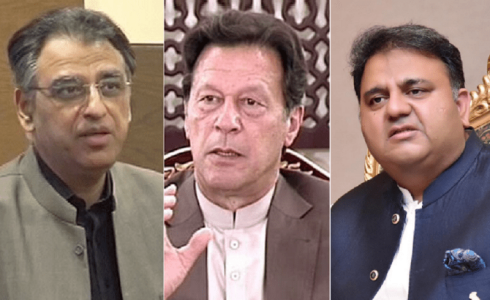The Supreme Court on Tuesday directed high courts hearing petitions filed by the PTI pertaining to the alleged contempt of Election Commission of Pakistan (ECP) to quickly decide on the matter.
A three-judge bench comprising Chief Justice of Pakistan Umar Ata Bandial, Justice Ayesha Malik and Justice Athar Minallah issued these directives while hearing the case.
The ECP had during August and September issued contempt notices, in exercise of its powers of contempt, against PTI chief Imran Khan and party leaders Asad Umar, Fawad Chaudhry, Mian Shabbir Ismail and Danial Khalid Khokhar for allegedly using “intemperate” language against the chief election commissioner and ECP and asked them to appear in person or through their counsels before the commission to explain their position.
However, instead of appearing before the ECP, the PTI leaders challenged in various high courts the ECP notices and contempt proceedings on the grounds that Section 10 of the Elections Act 2017, which is the statutory provision regarding the commission’s power to punish for contempt, was against the Constitution.
According to the Election Act 2017, Section 10 titled “Power to punish for contempt” states that the “election commission may exercise the same power as the high court to punish any person for contempt of court and the Contempt of Court Ordinance, 2003 (V of 2003), or any other law pertaining to contempt of court shall have effect accordingly[…]”
The PTI leaders had also sought from the high courts a declaratory relief from the charges.
Later, a petition was moved through Advocate Sajeel Sheryar Swati on behalf of the ECP with a request to order consolidation of all six petitions before one high court instead of defending the commission’s stance over the issuance of contempt notices against PTI leaders in different high courts.
At the onset of the hearing today, the ECP requested the apex court to consolidate all petitions filed by the PTI leaders against the election commission.
PTI lawyer Anwar Mansoor said the petitions could not be merged just for the facilitation of respondents.
Chief Justice Umar Ata Bandial asked whether subjudice matters in different courts could be clubbed together. “Explain this under the light of previous court orders,” he told the ECP.
The ECP counsel sought time for reading court decisions.
The chief justice observed that the ECP claimed it had been barred by the Lahore High Court from issuing a verdict against the PTI chief.
However, the CJP clarified that the LHC had stopped the ECP from the final decision and not the contempt proceedings.
“The decision against the former PM could only be taken after the completion of the proceedings in the ECP contempt case against Imran,” the court remarked.
“The proceedings under the contempt charges will continue as per the law,” the court added.
The ECP counsel told the court that the LHC had stopped the commission from proceedings against PTI leaders — Imran Khan, Fawad Chaudhry and Asad Umar.
Justice Ayesha Malik remarked that the disciplinary action could only be initiated once the contempt proceedings were wrapped.
“The Section 10 of the Election Act permits action for the contempt,” the ECP counsel told the court.
He lamented that the PTI leaders were not turning up before the commission.
Justice Malik interjected that no high court had barred the ECP from action.
“The commission has not been holding proceedings in the contempt case since October,” she added.
While wrapping the ECP’s pleas, the apex court directed high courts to decide on the PTI’s petitions against the election commission soon.
After hearing arguments from both sides, the court disposed of the petition with the a direction to the ECP to continue the contempt proceedings as per the law.












































